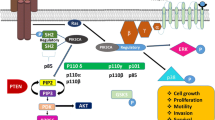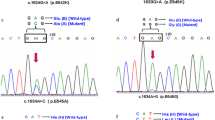Abstract
Background
Prognostic factors that could select breast cancer patients with poor survival, and influence clinical trials of targeted therapy, are needed. However, the reported observations regarding the impact of PI3KCA mutation on breast cancers are controversial.
Methods
We analyzed exons 4, 7, 9, and 20 of PI3KCA on a series of 158 patients. Clinicopathological characteristics were correlated with the mutation data.
Results
Among 152 patients who were available for follow-up (median follow-up time, 6.57 years), 26% had PIK3CA mutations, more than half of which occurred in exon 20. The five-year survival rate of patients with exon 20 mutations (46%) was significantly lower than that of patients without (75%) (p = 0.0054). Multivariate analysis showed that PIK3CA exon 20 mutations and nodal involvement were independent risk factors for overall survival. The relative risk of death in patients with PIK3CA exon 20 mutations was 2.881 (95% CI, 1.406–5.900; p = 0.0038).
Conclusions
PIK3CA mutations are common in invasive ductal carcinomas of the breast. Our result suggests that PIK3CA exon 20 mutation is an independent risk factor for poor prognosis in breast cancer patients, indicating that differences in patient numbers with PIK3CA exon 20 mutations in study and control arms should be avoided in clinical trials of PI3K inhibitors.

Similar content being viewed by others
References
Morgensztern D, McLeod HL. PI3K/Akt/mTOR pathway as a target for cancer therapy. Anticancer Drugs 2005;16:797–803
Samuels Y, Wang Z, Bardelli A, et al. High frequency of mutations of the PIK3CA gene in human cancers. Science 2004;304:554
Lee JW, Soung YH, Kim SY, et al. PIK3CA gene is frequently mutated in breast carcinomas and hepatocellular carcinomas. Oncogene 2005;24:1477–80
Campbell IG, Russell SE, Choong DY, et al. Mutation of the PIK3CA gene in ovarian and breast cancer. Cancer Res 2004;64:7678–81
Bachman KE, Argani P, Samuels Y, et al. The PIK3CA gene is mutated with high frequency in human breast cancers. Cancer Biol Ther 2004;3:772–5
Saal LH, Holm K, Maurer M, et al. PIK3CA mutations correlate with hormone receptors, node metastasis, and ERBB2, and are mutually exclusive with PTEN loss in human breast carcinoma. Cancer Res 2005;65:2554–9
Levine DA, Bogomolniy F, Yee CJ, et al. Frequent mutation of the PIK3CA gene in ovarian and breast cancers. Clin Cancer Res 2005;11:2875–8
Wymann MP, Pirola L. Structure and function of phosphoinositide 3-kinases. Biochim Biophys Acta 1998;1436:127–50
Law BK. Rapamycin. An anti-cancer immunosuppressant? Crit Rev Oncol Hematol 2005;56:47–60
Leevers SJ, Vanhaesebroeck B, Waterfield MD. Signalling through phosphoinositide 3-kinases: The lipids take centre stage. Curr Opin Cell Biol 1999;11:219–25
Vivanco I, Sawyers CL. The phosphatidylinositol 3-kinase AKT pathway in human cancer. Nat Rev Cancer 2002;2:489–501
Tzen CY, Huang YW, Fu YS. Is atypical follicular adenoma of the thyroid a preinvasive malignancy? Hum Pathol 2003;34:666–9
Wu G, Xing M, Mambo E, et al. Somatic mutation and gain of copy number of PIK3CA in human breast cancer. Breast Cancer Res 2005;7:R609–R16
Li SY, Rong M, Grieu F, et al. PIK3CA mutations in breast cancer are associated with poor outcome. Breast Cancer Res Treat 2006;96:91–5
Bader AG, Kang S, Vogt PK. Cancer-specific mutations in PIK3CA are oncogenic in vivo. Proc Natl Acad Sci USA 2006;103:1475–9
Acknowledgments
This study is supported in part by Grant NSC 94-2320-B-195-001 from the National Science Council, Taiwan, and MMH-E-95002 from Mackay Memorial Hospital, Taipei, Taiwan. The authors thank Jui-Hung Chu for statistical analysis and Chun-Yu Kuo for reviewing this manuscript from a statistician’s point of view.
Author information
Authors and Affiliations
Corresponding author
Rights and permissions
About this article
Cite this article
Lai, YL., Mau, BL., Cheng, WH. et al. PIK3CA Exon 20 Mutation is Independently Associated with a Poor Prognosis in Breast Cancer Patients. Ann Surg Oncol 15, 1064–1069 (2008). https://doi.org/10.1245/s10434-007-9751-7
Received:
Revised:
Accepted:
Published:
Issue Date:
DOI: https://doi.org/10.1245/s10434-007-9751-7




